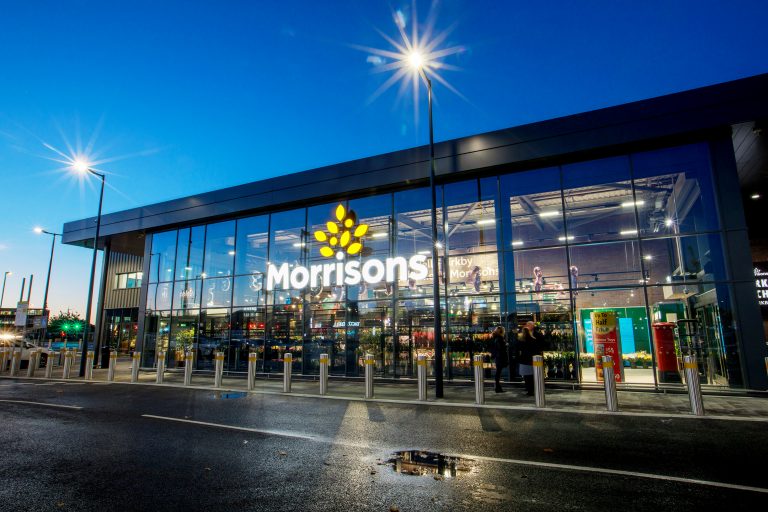Two new deals completed at historic Yorkshire mill
Two new deals have been completed at Sunny Bank Mills, the historic Yorkshire mill complex between Leeds and Bradford.
Ladies nightwear and underwear manufacturer Marsylka has moved into the iconic 1912 Mill in Farsley, where YTV’s Emmerdale and Heartbeat were filmed, while expanding medical services company Technomed has doubled its office space in the same building.
During the past ten years Sunny Bank Mills, one of the most famous family-owned mills in Yorkshire, has been transformed into a modern office and mixed-use complex for the 21st century, creating 400 sustainable new jobs.
Robert Hainsworth, Managing Director of Marsylka, which was founded in 1936 and which supplies high-profile retailers like Tesco and Marks & Spencer, explained the reasons for the company’s move.
“We have a warehouse nearby and the Farsley area is reasonably well-located for most of the people who work in the office. It is quite a peaceful place to work but there are good facilities nearby. I live a few miles away and have visited Sunny Bank Mills a number of times over the last few years.
“We have two factories in Sri Lanka employing 1300 people, where all our production and sampling and most merchandising is carried out. We mainly ship direct from Sri Lanka to our customers’ own warehouses. In the UK we now employ 23 people in sales and warehousing and our space requirement has changed.
“As a result, we have decided to separate our warehouse and office functions, with 10 staff moving to our new office in the 1912 Mill. The whole process from our initial visit to moving in was smooth, with landlords John and William Gaunt being very helpful.”
Meanwhile Technomed, which provides cardiology diagnostic services to NHS trusts and to the private sector, first moved to Sunny Bank Mills in 2019, initially in the Old Engine Room, before moving into a larger office in the 1912 Mill.
Mark Pashley, Managing Director, explained: “Due to the sustained growth of the business, this year we have opened another two offices in the 1912 building. The main focus of these two additional offices is to support our direct-to-patient postal service where hospitals and other healthcare organisations can request heart monitors which are sent to the patients’ homes, therefore removing the need to visit a clinic.
“John and William have been excellent at every stage of the journey here at Sunny Bank Mills. Our unique need for specialist technical infrastructure and bespoke room configurations to meet clinical requirements have always been welcome, implemented quickly and to a very high standard.
“Their ongoing support and flexibility made the decision to continue expanding the business here at Sunny Bank Mills incredibly easy,” added Mark.
John Gaunt said: “We are delighted to welcome Marsylka to Sunny Bank Mills and to accommodate the expansion programme of Technomed. It’s tremendously fitting that a clothing manufacturer like Marsylka, with such a rich history, should choose an old textile mill like ours, while it is incredibly satisfying to nurture and help a flourishing company like Technomed to grow.
“Both these deals are a resounding endorsement of the quality of our flagship 1912 Mill, the most prominent and spacious building in the mill complex. Plans are now being drawn up to refurbish the remaining 14,000 sq ft into quality office space over two floors available to let in a variety of configurations.”
Sarah-Jayne Lishman of Leeds-based marketing agents Dove Haigh Phillips, said: “The owners of Sunny Bank Mills took the brave decision to invest heavily in their mill and this decision has paid dividends.
“This is one of the most significant mill regeneration projects in Yorkshire. Steeped in history and with massive potential, Sunny Bank Mills is now one of the prime business locations in the West Leeds area.”
Competition watchdog is minded to allow sale of Morrisons filling stations
The Competition and Markets Authority proposes to accept an offer from buyer of Morrisons to sell 87 petrol stations to address competition concerns.
In January, the Competition and Markets Authority opened its investigation into Clayton, Dubilier & Rice Holdings LLC’s £7bn purchase of Wm Morrisons Supermarkets Ltd.
CD&R is the owner of the Motor Fuel Group, the UK’s largest independent operator of petrol stations, with 921 sites, while Morrisons operates 339 petrol stations across England, Scotland and Wales. The CMA’s Phase 1 investigation focused on local areas where both businesses operated petrol stations.
Following its Phase 1 investigation, the CMA found that the deal raises competition concerns in relation to the supply of petrol and diesel road fuel in 121 areas across England, Scotland and Wales – so could lead to higher prices for motorists in these locations.
In order to address these concerns, CD&R has now offered to divest 87 of MFG’s petrol stations to a purchaser or purchasers to be approved by the CMA.
The CMA says it’s minded to accept these proposals, which appear to be suitable to restore the loss of competition brought about by the deal across each of the 121 local areas in which the concerns were identified. While the number of petrol stations CD&R is proposing to sell is lower than the number of areas in which concerns were identified, the sale of some petrol stations would address the concerns in multiple areas.
The CMA is now consulting on the proposals – known as undertakings – for the sale of these petrol stations. If the CMA accepts the proposals, the deal would be cleared to proceed.
Colin Raftery, Senior Director of Mergers, at the CMA, said: “The sale of these petrol stations will preserve competition and prevent motorists from losing out due to this deal, which is particularly important when prices have recently hit record highs. If we conclude that the competition issues have been addressed following a consultation on CD&R’s offer, the deal will be cleared.”
Manufacturing growth picks up despite rising price inflationary pressures
The start of the second quarter saw a mild growth acceleration in the UK manufacturing sector. The rate of expansion in output improved from March’s five-month low, leading to a further solid increase in staffing levels.
The seasonally adjusted S&P Global / CIPS UK Manufacturing Purchasing Managers’ Index® (PMI®) rose to 55.8 in April, up from 55.2 in March and the earlier flash estimate of 55.3. The PMI – which is calculated as a weighted average of five subindices – has signalled expansion for 23 successive months.
Manufacturing production increased across the consumer, intermediate and investment goods industries. Solid rates of expansion were registered in the latter two categories, while the expansion at consumer goods producers was only marginal.
Companies linked higher production to increased intakes of new business, reduced delivery delays (compared to earlier in the year) and efforts to clear backlogs of work. The outlook
also remained positive, with almost 55% of companies expecting output to rise over the coming year. However, the overall degree of confidence slumped to a 16-month low.
Strong growth headwinds continued to buffet manufacturers during April. New order growth slipped to its weakest in the current 15-month upturn, stymied by lower intakes of new export business and the impact on demand from rising selling prices. Weaker foreign demand reflected subdued conditions in overseas markets, the war in Ukraine and
transportation issues. Lacklustre demand from the EU was linked to longer delivery times, customs checks and higher shipping costs post-Brexit.
Inflationary pressures continued to build at manufacturers. Input costs rose at the second-strongest pace in the survey history. Around 85% of companies registered an increase in
purchase prices, while there were no reports of a decrease (a survey first). The rate of inflation at consumer goods producers hit a series-record high.
A broad range of inputs were reported to be up in price. This included chemicals, energy, food, freight, fuels, gas, metals, oil, plastics, polymers, timber, and transportation (air, land
and sea). Several companies simply noted that “everything” cost more. Supplier price increases, market forces, the war in Ukraine, general inflationary pressure and China lockdowns also contributed to higher purchase prices.
April also saw output charges increase to a record extent, as manufacturers acted to pass on rising costs. Almost 61% of companies reported an increase in selling prices, compared
to less than 1% initiating a reduction. Rates of output charge inflation were either at, or near to, series-record highs across the consumer, intermediate and investment goods sectors.
Employment rose for the sixteenth month running in April, as companies reacted to increased production and rising order backlogs, prepared for expected future growth and
addressed staff shortages. Job creation was seen in the consumer, intermediate and investment goods industries and at SMEs and large-sized companies alike.
Purchasing activity increased for the fifteenth month in a row during April. Companies reported buying inputs in advance of expected price rises, to build-up safety stocks and to guard against further supply chain disruption.
Vendor lead times lengthened again in April. This reflected input shortages, port congestion, COVID issues, a lack of transportation capacity (especially for trucks and shipping), customs clearance delays, lockdown in China and the war in Ukraine.
Commenting on the latest survey results, Rob Dobson, director at S&P Global, said: “The improved expansion of output at manufacturers, while positive in itself, failed to mask the continued headwinds buffeting the sector at the start of the second quarter. New business growth near-stalled as a slowdown in the domestic market was accompanied by a further deterioration in export orders.
“Manufacturers and their clients are struggling as lockdowns in China and the Ukraine war exacerbate stretched global supply chains, the inflationary picture worsens and geopolitical tensions rise. Specific to the UK, Brexit represents an additional headwind, notably via lost
EU customers, increased paperwork, customs checks and border delays. Business optimism has fallen to a 16-month low as companies become more cautious about the future outlook.
“The inflationary situation is getting increasingly fraught. Input costs rose to the second-greatest extent in the 30-year survey history, leading to a record increase in factory gate
selling prices. Around 85% of manufacturers reported higher purchasing costs, compared to no reports of a decrease, with several firms simply noting that ‘everything’ was up in price. Worryingly, consumer goods producers reported record increases in both output charges and input costs, which is likely to further constrain household spending and reinforce the cost-of-living crisis.”
Duncan Brock, group director at the Chartered Institute of Procurement & Supply, said: “In spite of the softer rate of expansion in new business, the manufacturing sector held its ground in April, benefiting from work already in hand and recent easing of supply chain
stresses.
“However, it is difficult to see where ongoing growth will come from in the coming months as new order growth was the most sluggish in over a year. Higher costs and shortages
took a bite out of potential opportunities with clients hesitating to place orders and Brexit obstacles weighing down as work from overseas shrank for a third month in a row. Not one business in the survey reported paying less for their materials in April and 85% of supply chain managers reported higher costs, leading to the second highest inflationary rise in PMI history.
“Manufacturers are certainly feeling the pressure resulting in less optimism for the year ahead. With the lowest business expectations since December 2020, the global economy will need to pull a rabbit out of the hat to give manufacturers the leg up they need.”
Business distress figures could be ‘calm before the storm’ – claim
Signs that business distress may have stabilised in the first three months of this year are likely to be dramatically reversed as the global economy starts to feel the devastating impact of the war in Ukraine and soaring energy prices.
Begbies Traynor’s latest data reveals a 22% drop in ‘significant’ or early-stage distress in Lincolnshire, compared to the first quarter of last year when the country was in lockdown, and a 4% fall compared to the final quarter of 2021. Across the UK as a whole, significant distress fell by 20% year on year and 1% since the previous quarter.
Gareth Rusling, who heads Begbies Traynor’s Lincolnshire offices in Lincoln, Scunthorpe and Grimsby, said: “While at first glance these latest business distress figures seem to paint a relatively optimistic picture, of businesses in Lincolnshire, and the whole of the UK, beginning to emerge from the enormous challenges of the past two years, unfortunately they do not take into account the two most recent global developments that are already beginning to shake the economy to its core.
“The gathering storm of the war in Ukraine, and the sharp rise in energy prices and escalating cost of living crisis which the conflict is set to exacerbate, will inevitably put enormous strain on business across almost every sector.
“For small-business owner-managers in particular, it’s now essential to be as structurally and financially well prepared as possible. Seeking advice at the first signs of financial distress is also a wise move and means that more options are available to take positive action.”
In Lincolnshire the decline in business distress was seen across the whole economy in the first three months of 2022 compared with Q1 2021. Printing and packaging saw a 30% year-on-year fall, food and drug retail sector distress fell by 27%, while in Lincolnshire’s automotive sector, distress dropped by 27%.
In Q1 of 2022, compared to the final three months of 2021, distress continued to fall gradually across the regional economy, with only construction and general retail (both up 1%) and health and education (up 3%) seeing a slight increase in financial difficulties.
A short guide on organising your business for further success
When running a business, it’s easy to get overwhelmed by certain things. For example, remaining organised while trying to also hit your targets can be very difficult. While organising your business properly requires you to set aside some time to do so effectively, knowing how to keep your business organised without having to spend time deliberating on which methods to use can help keep you on track with running your business. And while it may take a bit of time to implement these new methods, ultimately, an organised business is going to be much more efficient and effective than one that isn’t.
Declutter Your Workspace
Whether you’re operating out of an office or retail space, ensuring that everywhere is decluttered is a brilliant step towards gaining more success as a company. When a space like this is cluttered, especially a retail space or stockroom, it can be much harder to find what you’re looking for, slowing workflow and even causing bottlenecks. As well as decluttering, it’s important to consider storing everything in an organised manner, labelling things, and using some great office storage ideas. This can keep everyone in the office working efficiently as they’ll know where everything is, or at least will be able to find things easily. Efficiency like this will provide your team with more time to spend on their current tasks instead of spending valuable time searching for the things they need.
Organise Your Documents
Like keeping your physical workplace organised, you’ll also want to ensure that your digital assets are well taken care of. Failing to have a well-thought-out and easy to use digital storage system in place is a common way in which documents can get lost. Having no system in place at all is a sure-fire way to increase your risk of important documents going missing, and therefore it’s important to make sure that everyone is following a strict set of rules when it comes to organising shared documents as well as their own. You can even make use of things like an online PDF merger to keep your PDF files in an easy-to-read format and reduce the amount of digital clutter on your company devices too. When you have fewer documents to sort through, it’s much easier to find what you’re looking for. Just remember that as well as sorting files into the right places, you make use of a proper naming system for these files and folders too.
Utilise Automation
The more tasks that your team takes on, the more their efficiency can decrease as well as their motivation. Unfortunately, when these tasks are menial yet necessary, they can’t be avoided. However, there are ways in which you can minimise the amount of time required to complete these tasks by implementing automation into your business. There are countless useful automation systems that can seriously benefit your business, from administrative automation such as email and payroll tasks to customer services and even marketing tasks. Making use of these automation solutions can grant your staff extra time to work on other important work, ultimately improving your chances for further success.
Leeds-based private equity firm acquires warehousing and distribution company
Private equity firm Winch & Co, which has its sights set on adding five logistics business to its increasing portfolio, has completed the acquisition of a North East freight operator and its 250,000 square foot industrial estate and distribution centre.
The purchase of Dedicated Transport Solutions, which operates a road transport fleet from its base in Cramlington, comes on the back of Winch & Co’s purchase of Eclipse Distribution Solutions, a £4m transport business based in Loughborough.
Winch & Co was founded by South Yorkshire entrepreneur Nathan Winch, who sold his first business in 2017. The business, which is based in the centre of Leeds and has 100 full-time employees, invests in UK companies operating in FMCG, industrial and service-based industries, as well as deploying dynamic growth capital.
Nathan Winch, managing partner, said: “This latest acquisition takes us another step closer in our goal to purchase five transport businesses, and DTS now takes its place alongside Eclipse Distribution Solutions whom we purchased last October.
“If there’s anything the Covid pandemic taught us, it’s the importance of logistics and warehousing. Without operators such as DTS and Eclipse Distribution, the nation would have ground to a halt.
“Whilst both these businesses are based in different parts of the country – DTS in the North East and Eclipse Distribution in the Midlands – they both operate nationally, and both have on-site warehousing facilities.”
He added: “DTS has plenty of potential, and for us it’s an exciting prospect. When we acquire a business, we do so to increase its profitability via investment and different ways of working. The previous owners built a solid business, and our job is to now drive it forward and take it to its next level.”
Winch & Co was advised by Ison Harrison Solicitors in Leeds. DTS was advised by Lupton Fawcett.
Mitie expands mobile telecoms capability with acquisition of Yorkshire-based 8point8
Mitie Group has acquired 8point8 Support Limited, 8point8 Training Limited and Vantage Solutions Limited (collectively “8point8”), a provider of design and construction services based in Yorkshire, predominantly for mobile telecoms tower infrastructure.
Total consideration is £10m and the acquisition will be accretive to earnings and funded through existing facilities.
With the growing demands of the 5G rollout, network upgrades and passive infrastructure investment, Mitie’s strategy is to build a leading Telecoms Support Services company, providing acquisition, design and construction (ADC) services, and maintenance to the mobile telecoms tower infrastructure sector.
Following Mitie’s recent acquisitions of DAEL Ventures UK and P2ML Limited, integrating 8point8 into its telecoms division will give Mitie greater capacity to self-deliver additional end-to-end services.
8point8 also includes two associated businesses, 8point8 Training – an industry leading training provider – and Vantage Solutions – a specialist contract lifting business. Together, these capabilities will provide Mitie with the opportunity to set the standard in health and safety for the industry whilst adding the capacity to increase self-delivery of critical services.
For the 12 months ended 31 December 2021, 8point8 generated combined revenues of £18.3m and profit before tax of £0.6m, with gross assets of £6.2m. Performance since 31 March 2021 has seen 8point8 make a strong recovery from the significant operational disruption associated with the COVID pandemic.
The management of 8point8 will be joining Mitie Telecoms and Sam Storer, currently MD of 8point8, will be appointed Chief Commercial Officer of Mitie Telecoms.
Andy Train, MD, Mitie Telecoms, said: “The acquisition of 8point8 substantially increases our capacity within the fast-growing mobile telecoms sector and adds another well-respected team to the Mitie Telecoms business.
“We are now one of the largest Telecoms Support Services businesses in the UK, with strong capabilities to support all aspects of cell site acquisition, design, construction and ongoing site maintenance, allowing us to better serve our existing customers and to continue to add new clients as the rollout of 5G in the UK gathers pace.”
New appointment to advance Unity’s ambitious development programme
Unity Homes and Enterprise has appointed Sean Kelly as regeneration manager.
Reporting to regeneration director Wayne Noteman, he will play a lead role in delivering the Leeds-based BME housing association’s development programme and oversee the work of Unity’s Employment Services Team to support tenants and clients into jobs and training.
Mr Kelly joins Unity after three years as group head of development at Incommunities, having previously held a range of senior housing positions including design and build manager at Lumia Homes, and development and procurement manager at Firebird Homes.
He is a graduate of Leeds Metropolitan University where he gained a BSc in Project Management.
Formed in 1987 to address the needs of black and minority ethnic communities in Leeds, Unity now manages more than 1,300 affordable homes across the city, as well as new build schemes in Huddersfield and Cleckheaton.
Sean Kelly said: “Unity has a long-established reputation as a housing association rooted in local communities and dedicated to improving lives.
“It is also highly regarded in the sector for the quality of its new build properties, as the succession of affordable schemes in Leeds and elsewhere demonstrates.
“I look forward to working closely with Wayne, the Senior Management Team and Unity’s partners locally and nationally to advance Unity’s ambitious development programme in the years ahead.”
Cedric Boston, Unity Chief Executive, said: “It is a pleasure to welcome Sean to Unity. His local knowledge and years of experience as a housing professional will enable him to hit the ground running.
“The Regulator of Social Housing recently announced that Unity had retained its G1 V1 ratings, the highest levels achievable, and we have exciting plans for the future including ambitious development projects.
“Sean will be at the forefront of this work as we continue our mission to revitalise local communities, stimulate social and economic regeneration, create life opportunities and address inequalities within sustainable neighbourhoods.”
Former Carpetright outlet in York set to be transformed into hotel
The site of a former Carpetright outlet in York is set to be transformed into a Premier Inn hotel designed by The Harris Partnership.
The 188-bedroom, four-storey development has been designed to enhance the local street scene and respect the urban grain by using materials in keeping with the historic nature of the area combined with the latest in environmental technologies including air source heat pumps, heat recovery ventilation, LED lighting, photovoltaic cells, and six electric car charging points, to ensure the carbon footprint of the building is kept to a minimum.
Nick Charlesworth, director at The Harris Partnership, said: “Our design aims to significantly improve the ecology opportunities and improve the overall environment by providing a sustainable development for Premier Inn.”
Early 2022 sees Yorkshire and North East profit warnings increase 67% year-on-year, as companies face ‘crisis as normal’
Listed businesses in Yorkshire and the North East issued five profit warnings in Q1 2022, up 67% from Q1 2021, according to EY-Parthenon’s latest Profit Warnings report.
The number of warnings issued (five) between January and March remains in line with the previous quarter. In the region, warnings were issued across a range of industries, including consumer-facing sectors, where UK warnings reached their highest level since the second quarter of 2020, with 36% of warnings citing supply chain disruption and 69% blaming rising costs.
Tim Vance, EY Parthenon UK&I Turnaround and Restructuring Leader in Yorkshire and the North East, said: “We expected that 2022 would be a difficult year for companies to navigate as inflationary pressures, which had been building throughout 2021, were already putting pressure on company margins and consumers’ real incomes. We are now looking at a year with ongoing COVID-19 disruption alongside higher inflation, greater uncertainty, and faster monetary tightening than we expected just a few months ago.”
Total UK Profit Warnings
The number of profit warnings issued by UK-listed companies in the first quarter of 2022 increased 44% year-on-year with a record number of warnings citing rising costs as increased commodity and energy prices fuel inflation, according to the latest EY-Parthenon Profit Warnings report.
The report reveals that UK-listed companies issued 72 warnings in Q1 2022, the highest quarterly figure since the start of the pandemic in the second quarter of 2020. A record-breaking 43% of warnings were due to rising costs, up from 27% in Q4 2021 and well above the 2011-2021 average of 10%.
Eleven per-cent (11%) of warnings cited the impact of the war in Ukraine, with most referencing the impact of sanctions and withdrawal from Russian markets. Meanwhile, supply chain challenges eased slightly in Q1 2022 with 22% of listed companies issuing a warning referencing this as the main reason for doing so.
Vance continues: “The post-pandemic recovery should continue in 2022 but will be slower than expected with greater downside risks. Volatility and uncertainty have become the standard backdrop to operations, and companies need to ask themselves when ‘crisis as usual’ becomes the norm for which they plan. Businesses will need to start thinking about how their operations and wider ecosystem will fare in sustained headwinds, and how they can reshape in response to long-term change.”
Supply chain issues hamper post-pandemic recovery
The FTSE sectors with the highest number of warnings in Q1 2022 were those most affected by cost and supply chain pressures, alongside those that are most sensitive to changes in business confidence. FTSE Retailers issued the most warnings in the first quarter of the year (nine in total), followed by FTSE Industrial Support Services (seven) and Personal Care, Drug and Grocery Stores (six).
EY’s analysis forecasts that supply chain challenges could be even tougher in 2022 than in 2021, with the periodic breakdowns in supply witnessed last year potentially giving way to significant challenges for material and product availability in the most exposed sectors in 2022.
The war in Ukraine has helped tighten supplies in areas like metals and semiconductors, which has led to businesses again adjusting production and forecasts, as well as having to factor in increases in energy and transport costs. In addition, the biggest emerging issue in profit warnings, according to EY’s data, is contract delays and cancellations, reflecting the increasing uncertainty around company investment decisions.
Headwinds for UK retail
Despite strong levels of consumer spending, UK-listed Retailers issued nine profit warnings in Q1 2022 – the highest quarterly total since the start of the pandemic, accounting for 17% of all listed Retailers. Over one-third of FTSE Retailers (34%) have issued a warning in the last 12 months.
The sector has been affected by supply issues with 67% of retail warnings citing supply chain disruption, 75% blaming increased costs and over half (56%) revealing staffing issues in the last six months. Consumer sector profit warnings look set to remain high as the ability to pass costs on depends on the capacity of increasingly pressured consumers to absorb them.
Silvia Rindone, EY UK&I Retail Lead, said: “Our data underlines the challenges ahead for UK retail. The sector’s problems so far have been largely on the supply – rather than demand – side. Companies will now be facing a combination of supply chain, cost, and demand headwinds, as the rise in the cost-of-living affects real incomes and creates a challenge for the sales growth that has helped drive the recovery so far.
“It is vital that companies respond to consumers’ concerns. Our latest Future Consumer Index revealed that more than two-thirds of UK consumers are worried about their finances. So, we expect significant ‘trading down’, as we saw in the last financial crisis, but we also expect an increasing focus on ‘value for money’ options as sustainability-conscious consumers look for purchases that will last.
“Retailers will also need to focus on operational resilience by creating clear inventory visibility and a strong cash culture to minimise costly write-offs and optimise working capital to ensure they have the capital necessary to focus on growth and transformation. Digital opportunities and consumer expectations will continue to grow, regardless of the economic backdrop.”












